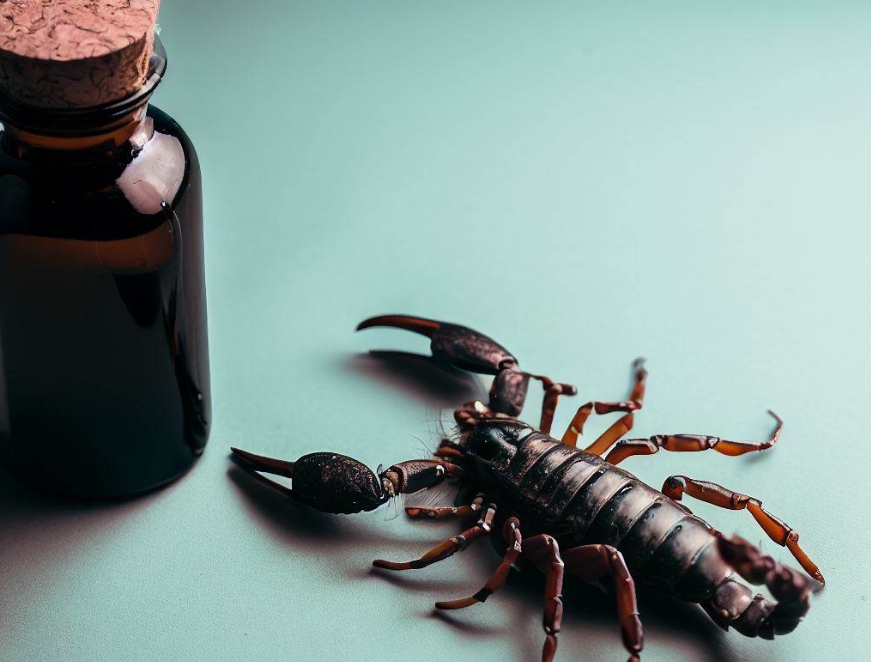Scorpion venom is one of the most expensive liquids in the world, but have you ever wondered how much is scorpion venom worth per ounce? This may seem like a strange question, but when you consider the numerous applications of this potent substance, it becomes clear why so many people are interested in its value. In this comprehensive guide, we’ll explore the fascinating world of scorpions, their venom, and the incredible worth of this rare and sought-after liquid.
Scorpions: More Than Just a Dangerous Creature
Contents
Scorpions are often feared for their potentially deadly stings, but they are also fascinating creatures with a rich history and a variety of unique adaptations. For instance, did you know that scorpions are more closely related to lobsters than insects? Or that some species, like the yellow-tailed scorpion, have found their way to the UK?
These arachnids have evolved to survive in some of the harshest environments on Earth, such as deserts and forests, thanks to their adaptations. They come in various colors, such as the intriguing clear scorpion or the rare white scorpion. But it’s not just their appearance that makes scorpions fascinating – their venom is what truly sets them apart.
The Value of Scorpion Venom
So, how much is scorpion venom worth per ounce? The answer might surprise you – it can range from $8,000 to $39,000 per ounce. Why is it so expensive? There are a few reasons:
- Scarcity: Scorpion venom is not easy to obtain. It takes a lot of time, effort, and skill to collect venom from a scorpion. In fact, one scorpion produces only 0.5 milligrams of venom per extraction, which means it takes roughly 2,000 venom extractions to produce just one ounce of venom.
- Potency: Scorpion venom is incredibly potent. A single drop can contain millions of venom molecules, each capable of causing significant harm. This potency makes the venom highly valuable for medical and scientific research.
- Medical Applications: The venom’s unique properties have been found to have potential applications in treating a variety of medical conditions, such as cancer, autoimmune diseases, and chronic pain. The demand for scorpion venom in medical research contributes to its high price tag.
- Risk: Collecting scorpion venom is not without its dangers. Scorpion stings can be extremely painful and sometimes life-threatening, especially if the victim is allergic to the venom or the scorpion species is particularly venomous. This risk adds to the cost of obtaining scorpion venom.
Scorpion Venom Extraction: A Step-by-Step Guide
To understand the value of scorpion venom, it’s helpful to know how it is extracted from the scorpion. The process usually involves the following steps:
- Capture: First, the scorpions must be captured. This can be done using various methods, such as hunting at night when scorpions are most active, or using specialized traps.
- Preparation: Once captured, the scorpions must be prepared for venom extraction. This typically involves securing them in a way that allows access to their stingers without risking a sting to the handler.
- Stimulation: The scorpion’s venom gland is then stimulated, usually through the application of a mild electrical current. This causes the gland to contract and release a small amount of venom.
- Collection: The venom is carefully collected using specialized equipment, such as a fine glass pipette or a capillary tube. This process must be done with extreme precision to avoid contaminating the venom or injuring the scorpion.
- Preservation: The collected venom is then preserved, typically by freeze-drying, to maintain its potency and prevent degradation. This also allows for easier transport and storage.
- Processing: Finally, the venom is processed and purified, ensuring that it is safe and effective for use in medical research or other applications.
Scorpion Species and Their Venom
Not all scorpion venom is created equal – different species produce venom with varying levels of potency and medical potential. Some of the most sought-after venom comes from the following species:
- Asian Forest Scorpions: These large, aggressive scorpions are found throughout Asia and have potent venom used in traditional medicine and scientific research.
- Desert Scorpions: As their name suggests, these scorpions inhabit desert regions and are known for their hardiness and ability to survive in extreme conditions. Their venom is highly valued for its potential applications in medical research.
- Deathstalker Scorpions: One of the most venomous scorpion species, the deathstalker’s venom is in high demand for its potential in cancer research and treatment.
Scorpion Venom in Medical Research
Scorpion venom’s incredible worth per ounce is due, in large part, to its potential in medical research. Here are some examples of how scorpion venom is being used in groundbreaking research:
- Cancer treatment: The venom from the deathstalker scorpion contains a compound called chlorotoxin, which has shown promise in targeting and killing cancer cells. This compound is being researched for its potential in treating brain tumors and other cancers.
- Autoimmune diseases: Scorpion venom contains molecules that can help modulate the immune system, making it a potential treatment for autoimmune diseases like multiple sclerosis and rheumatoid arthritis.
- Chronic pain: Scorpion venom contains peptides that can block pain signals in the nervous system, making it a potential alternative to opioid painkillers for treating chronic pain.
- Antibacterial properties: Some scorpion venom has been found to have antibacterial properties, which could lead to the development of new antibiotics to combat drug-resistant bacteria.
Scorpion Stings: What to Do if You’re Bitten
While the value of scorpion venom is undeniably fascinating, it’s essential to remember that scorpion stings can be dangerous. If you’re bitten by a scorpion, it’s crucial to seek appropriate treatment as soon as possible. Symptoms of a scorpion sting can vary depending on the species, but some common signs include pain, swelling, numbness, and difficulty breathing.
In conclusion, the worth of scorpion venom per ounce is truly astonishing, driven by the unique properties of this potent substance and its potential applications in medical research. By better understanding the fascinating world of scorpions and their venom, we can appreciate the incredible value of this rare and sought-after liquid. So the next time you encounter a scorpion, remember that its venom is not just a dangerous weapon, but also a substance with immense potential to change the world of medicine and scientific research for the better.
FAQ
Q: How much is scorpion venom worth per ounce?
A: Scorpion venom can range from $8,000 to $39,000 per ounce, depending on the species and the purity of the venom. The high price is due to the rarity, potency, and potential medical applications of the venom.
Q: Why is scorpion venom so expensive?
A: Scorpion venom is expensive because it is scarce, potent, and has potential medical applications. The process of collecting scorpion venom is time-consuming, labor-intensive, and risky, which adds to the cost.
Q: Which scorpion species have the most valuable venom?
A: Some of the most sought-after venom comes from Asian Forest Scorpions, Desert Scorpions, and Deathstalker Scorpions. The venom from these species is highly valued for its potential applications in medical research, particularly in cancer treatment, autoimmune diseases, and chronic pain management.
Q: How is scorpion venom extracted?
A: Scorpion venom is extracted through a process that involves capturing the scorpion, preparing it for extraction, stimulating the venom gland (usually with a mild electrical current), collecting the venom with specialized equipment, preserving the venom (typically by freeze-drying), and processing it for use in medical research or other applications.
Q: Is scorpion venom dangerous?
A: Scorpion venom can be dangerous if a person is stung by a scorpion, particularly if the individual is allergic to the venom or the scorpion species is highly venomous. However, when used in medical research, the venom is carefully processed and purified to ensure safety and efficacy.
Q: Can scorpion venom be used as a medical treatment?
A: Scorpion venom is currently being researched for its potential applications in medical treatments, such as cancer therapy, autoimmune disease management, and chronic pain relief. Although many promising discoveries have been made, more research is needed before scorpion venom can be widely used as a medical treatment.



